
When building a website or an online store, three popular website builders come to mind: Wix, Shopify, and WordPress. Each platform has strengths and weaknesses, and choosing the right one can be challenging, especially for beginners. Wix is known for its easy-to-use drag-and-drop editor and affordable pricing plans, making it an excellent option for small businesses and personal websites. Shopify is a popular choice for eCommerce websites, offering advanced features such as inventory management, payment gateways, and shipping integrations. WordPress is an open-source platform that offers advanced design and customization options, making it an excellent choice for complex websites with a lot of content.
This post reviews Wix, Shopify, and WordPress, discussing their features, pricing plans, ease of use, design and customization options, eCommerce functionality, SEO capabilities, third-party integrations, and customer support. Whether one is a beginner looking to build a simple website or an experienced user looking to create a complex online store, this review will help them understand the pros and cons of each platform and choose the one that best suits their needs.
Wix Vs. Shopify Vs. WordPress: Comparative Overview
Wix offers a user-friendly platform with a wide range of customizable templates making it ideal for individuals and small businesses looking to create websites without extensive technical knowledge. Shopify excels in providing a diverse eCommerce solution, featuring comprehensive tools for inventory management, payment processing, and integration with various shipping options, catering to businesses focused on online sales. WordPress delivers unmatched flexibility and customization, catering to users ranging from bloggers to large enterprises, with its extensive plugin ecosystem and theme options for creating a unique website.
|
Price |
Ease of Use |
Design and Customization |
Features and Functionality |
Customer Support |
|
|
Wix |
$4.50 per month |
|
|
|
|
|
Shopify |
$25.00 per month |
|
|
|
|
|
WordPress |
$8.87 per month |
|
|
|
|
Pricing and Value: Wix, Shopify or WordPress
Wix offers flexible pricing plans that cater to various needs, providing a good balance between cost and features for those looking to build personalized websites without breaking the bank. While on the pricier side, Shopify delivers exceptional value for online stores, offering powerful e-commerce tools and capabilities that justify its higher cost. WordPress, being free to start with, can become costly as you add premium themes and plugins but is a versatile choice for those willing to invest in its expansive ecosystem for a customized website experience.
Pricing Plans: Overview
Wix, Shopify, and WordPress offer different options to suit various needs and budgets.
|
Free |
Connect Domain |
Combo |
Unlimited |
VIP |
|
|
Wix |
$0.00 per month |
$4.50 per month |
$8.50 per month |
$6.25 per month (Formerly $24.50 per month) |
$12.25 per month (Formerly $24.50 per month) |
|
Basic |
Shopify |
Advanced |
Plus |
||
|
Shopify |
$25.00 per month ($1.00 for the first month) |
$65.00 per month ($1.00 for the first month) |
$399.00 per month ($1.00 for the first month) |
$2,300.00 per month (Available on a 1- or 3-year term) |
|
|
Starter |
Explorer |
Creator |
Entrepreneur |
Cloud |
|
|
WordPress |
$8.87 per month (Save 68% by paying annually) |
$15.96 per month (Save 63% by paying annually) |
$33.69 per month (Save 50% by paying annually) |
$56.74 per month (Save 47% by paying annually) |
$65.00 per month (Starting at $64.99/month billed annually, excl. taxes) |
Wix offers free and affordable premium plans, making it an excellent option for small businesses and personal websites. Wix's premium plans range from $8.50 to $12.25 per month, depending on your desired features. The free plan has limited features, but it's a great way to test the platform before committing to a paid plan.
Shopify's pricing plans vary from $25 to $399 per month, offering features essential for online stores like inventory management, payment gateways, and shipping integrations. It includes a 14-day free trial, making it easier to evaluate the platform. Shopify also has enterprise plans for larger businesses starting at $2,300 per month.
WordPress is open-source and free, but costs for hosting, themes, and plugins can accumulate. Depending on the provider and plan, hosting might cost between $5 to $50 monthly. With thousands of free and premium themes and plugins, WordPress lets you tailor your site's appearance and functionality. Premium themes and plugins may cost between $50 and $300, adding to the overall expense of using WordPress for your website.
Value of Money
Wix offers free and affordable premium plans, making it an excellent option for small businesses and personal websites on a tight budget. Wix's premium plans offer a range of features, such as unlimited bandwidth, a free domain, and customizable templates, making it an excellent value for money. Wix's drag-and-drop editor and intuitive interface also make it easy to use, even for beginners.
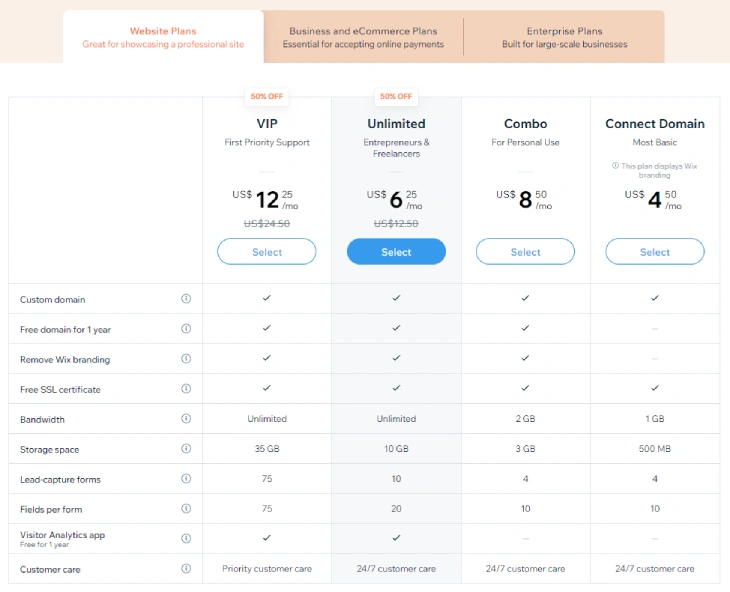
Shopify is more expensive than Wix, but it offers advanced eCommerce features that can help online stores generate more revenue. Shopify's plans include features such as abandoned cart recovery, product reviews, and discount codes, which can help increase sales and customer engagement. Shopify also offers 24/7 customer support, making it an excellent value for money for online stores that require technical assistance.
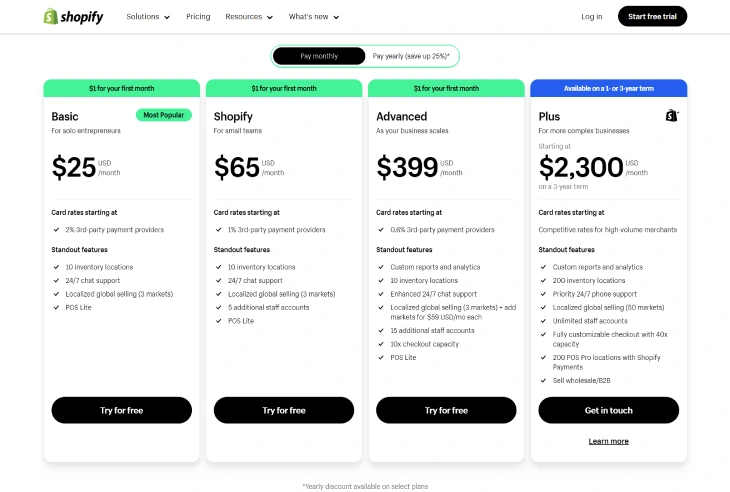
WordPress is open-source and free, yet costs for hosting, themes, and plugins can accumulate. Despite these costs, WordPress provides superior design and customization options, delivering great value for businesses seeking a distinctive and tailored website. It also offers many plugins for adding advanced features like eCommerce, social media integration, and email marketing. With strong SEO capabilities, WordPress can boost your website's visibility in search engine results, offering excellent value for businesses dependent on organic traffic.
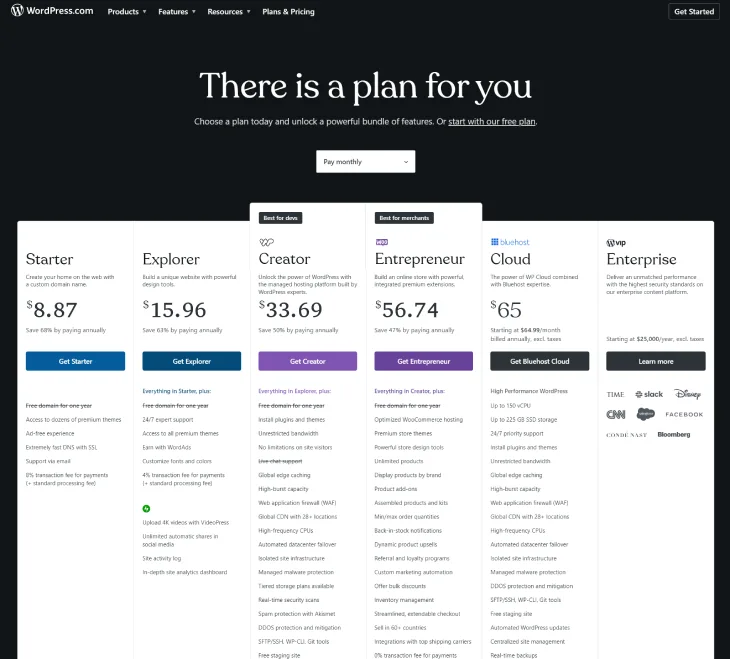
Ease of Use: Wix, Shopify or WordPress
Wix is known for its straightforward drag-and-drop interface, making it a breeze for anyone to create a beautiful website without needing to learn coding. Shopify offers an intuitive platform tailored for setting up and managing online stores with ease, though it might require a slight learning curve for complete beginners. WordPress, while offering unmatched flexibility and customization options, presents a steeper learning curve, especially for those who wish to look into its extensive features and plugins.
Drag-and-Drop Editors
Wix and Shopify offer drag-and-drop editors, while WordPress uses a block editor called Gutenberg.
Wix's drag-and-drop editor is intuitive and user-friendly, allowing you to easily add and move elements like text, images, and videos on your website. Wix also offers advanced design features such as animation and scroll effects, allowing you to create a unique and engaging website. Additionally, Wix's editor allows you to customize your website's mobile view, ensuring it looks great on all devices.
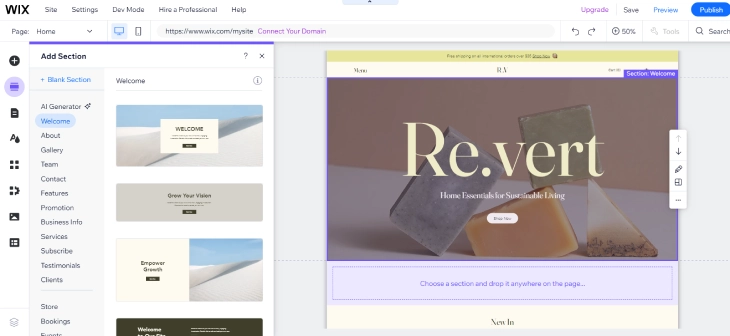
Shopify's drag-and-drop editor is designed with eCommerce in mind, simplifying the process of adding products, creating collections, and tailoring the look of your online store. It includes advanced options like product variants and inventory management, making it a standout choice for online stores, even letting you tweak the mobile view for a perfect display across devices.
On the other hand, WordPress's block editor, Gutenberg, might not be as straightforward for newcomers compared to Wix and Shopify's editors. Despite this, Gutenberg enables the addition of various blocks like text, images, and videos, offering more sophisticated design choices than its counterparts. WordPress also provides the flexibility to edit your website's code for full customization, although this level of control requires some technical skills and might be daunting for those just starting.
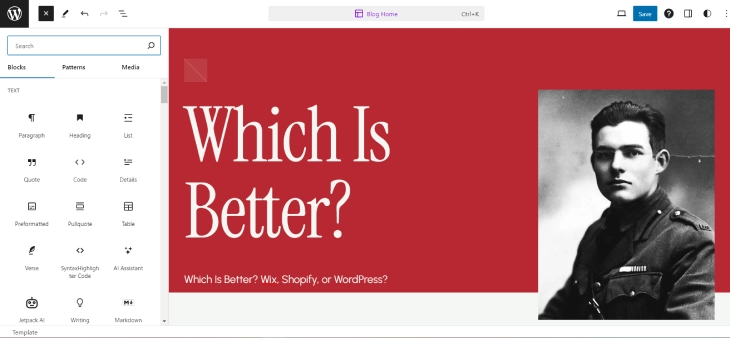
Site Navigation and Editing
Wix simplifies website creation with a clear sidebar menu and a mobile editor, making it ideal for users seeking an intuitive design experience. It enables easy content addition and editing, plus advanced design features like animation, catering to those wanting to create unique, visually appealing sites.
Shopify, with its straightforward navigation and a focus on eCommerce, allows for effortless management of products and online store customization, including mobile management via an app. WordPress, though offering a more complex navigation system, provides advanced site structuring options and deep customization through code editing, appealing to users with specific, complex website needs or those with technical expertise.
Design and Customization: Wix, Shopify or WordPress
Wix stands out for its extensive library of customizable templates and drag-and-drop interface, offering unparalleled freedom for users to design their websites exactly how they envision them. Shopify shines in e-commerce design, providing users with tools tailored for online store customization, from product displays to checkout processes.
WordPress is great for making your site look and work exactly how you want, thanks to the many themes and tools you can add. It's perfect for people who want to customize everything, but it might take a bit more effort to learn how to use it.
Templates
Wix offers over 500 free templates suitable for various industries, including restaurants and photography, with features like animation to make websites look dynamic. The drag-and-drop editor simplifies website customization, but choosing a new template later means redoing your site from scratch.
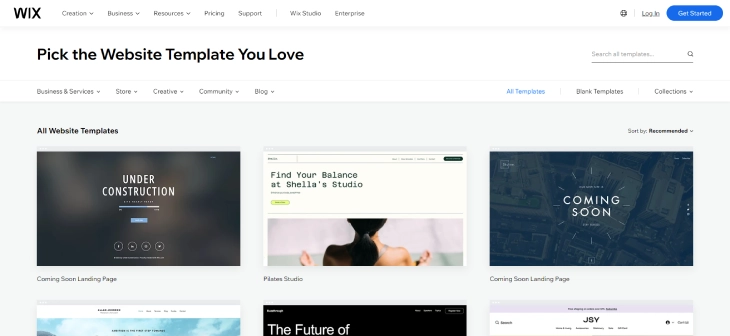
Shopify has about 70 templates, all designed for online stores with elements like product galleries and checkout options. These templates are user-friendly, and you can switch between them without losing any content, making updates and redesigns hassle-free.
WordPress boasts thousands of free and premium themes for a wide range of needs, from blogging to online sales, providing extensive customization options. The block editor facilitates adding and arranging content, but some premium themes might be pricey, and tweaking them could require some technical know-how.
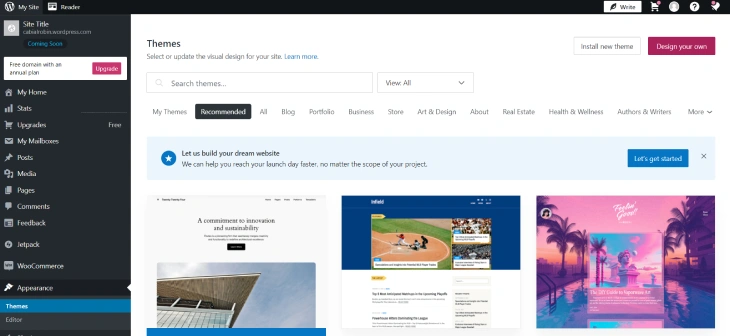
Design Flexibility
Wix is the most flexible website builder, letting users tweak nearly every detail of their site with a user-friendly drag-and-drop editor and the option to add custom code for more complex customizations. Shopify, tailored for eCommerce, offers a balance between flexibility and functionality, providing customization options for colors, fonts, and more, along with useful third-party apps and integrations.
While offering less design freedom than Wix, Squarespace prioritizes a polished and professional look with customizable templates that still allow significant changes to colors, fonts, and layouts. Choosing the right website builder depends on the user's needs: Wix for maximal customization, Shopify for online stores with flexible design needs, and Squarespace for sleek, professional websites with less need for complex customization.
Features and Functionality: Wix, Shopify or WordPress
Wix offers a comprehensive package with diverse design choices and features such as social media, email marketing, and bookings, making it great for small businesses and personal use. Shopify shines in online sales, with strong tools for inventory, payments, and shipping, catering to all business sizes. WordPress provides unmatched customization with a vast selection of plugins and themes for any purpose, ideal for users seeking flexibility and growth.
eCommerce
Wix provides eCommerce capabilities too but with not as many advanced features as Shopify. You can sell goods and services, access payment and shipping options, and use its mobile app to manage your store anywhere. Wix eCommerce might not be as great as Shopify for businesses with lots of products.

Shopify stands out for eCommerce sites with comprehensive features like inventory management, payment options, and shipping tools. It supports physical and digital sales, offering extras like abandoned cart recovery, product reviews, discount codes, and integration with Amazon and eBay for wider selling opportunities. Yet, it's pricier than Wix and WordPress, with plans from $25 to $399 per month.
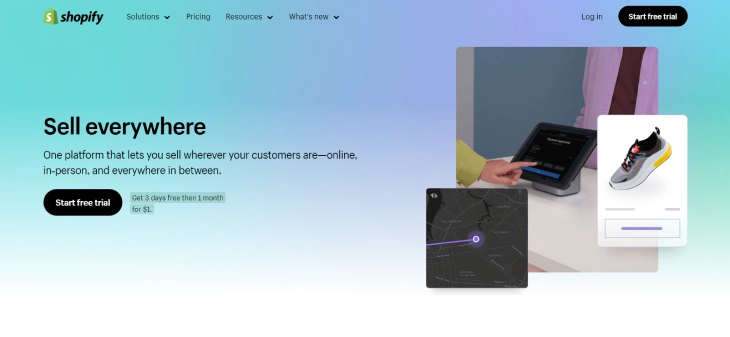
WordPress lets you enhance your online store with various eCommerce plugins, with WooCommerce being the most popular, including payment, shipping, and inventory management features. While WooCommerce is free, some add-ons cost extra. WordPress eCommerce also offers the flexibility to tweak your store’s design and features to your liking, though setting up a store and using some plugins might need tech skills and additional expenses.
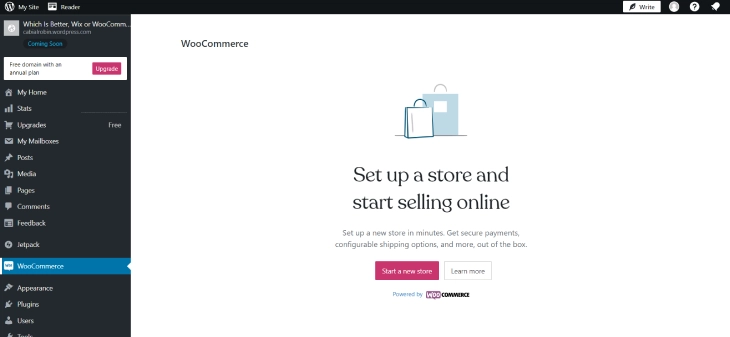
SEO
Wix provides basic SEO tools, letting you edit meta tags and URLs and a mobile editor for optimizing your site's mobile view. Yet, its SEO features might not be as comprehensive as WordPress, especially for detailed websites with lots of content.
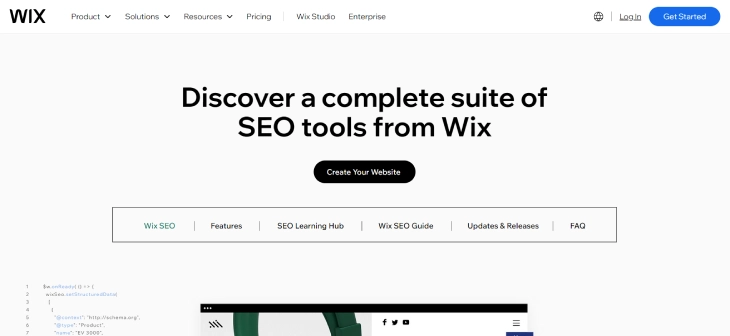
Shopify excels in SEO for online stores, offering automatic sitemap creation and canonical URLs, although it lacks URL customization options. With a mobile app, you can adjust your store's SEO on the move, making Shopify a strong choice for eCommerce sites, though it might fall short for non-eCommerce sites compared to WordPress.
WordPress stands out for SEO, offering extensive customization with meta tags, URLs, sitemaps, and powerful plugins like Yoast SEO for keyword optimization. This makes WordPress highly effective for improving search engine rankings, particularly valuable for businesses focusing on organic traffic. Optimizing SEO in WordPress might need some tech skills and could involve extra costs for certain plugins.
Third-Party Integrations
Wix supports a variety of third-party integrations like payment gateways and social media, with a user-friendly drag-and-drop editor for adding website elements. While some integrations might have a cost, and the range of options isn't as broad as WordPress, Wix still offers valuable tools for enhancing your site.
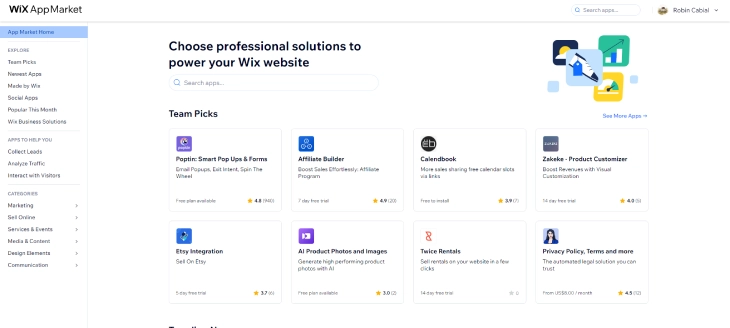
Shopify excels in third-party integrations tailored for eCommerce, including shipping and accounting, alongside a straightforward drag-and-drop editor for website customization. It specializes in advanced features such as inventory management, although some integrations might come with a monthly fee and might not cover as many options as WordPress.
WordPress boasts the largest selection of third-party integrations, with a vast array of free and premium plugins for adding functionalities like eCommerce and email marketing. The block editor simplifies plugin use, but using some plugins might need tech know-how, and costs for premium options can add up. Checking plugin compatibility with your theme is important for smooth operation.
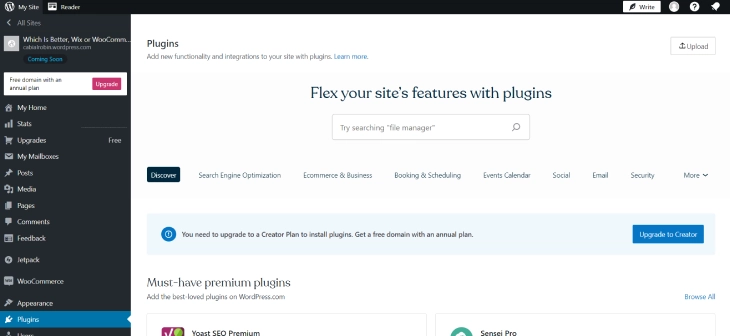
Customer Support: Wix, Shopify or WordPress
Wix provides robust customer support with phone, email, and a detailed help center, making assistance readily available. Shopify offers 24/7 support via live chat, email, and phone, ideal for businesses needing constant help. WordPress depends on community and online resources for support, offering extensive forums and guides rather than direct assistance.
Support Channel
Wix provides 24/7 phone and email support, a knowledge base, a community forum, and a unique callback service for scheduling calls with support agents.
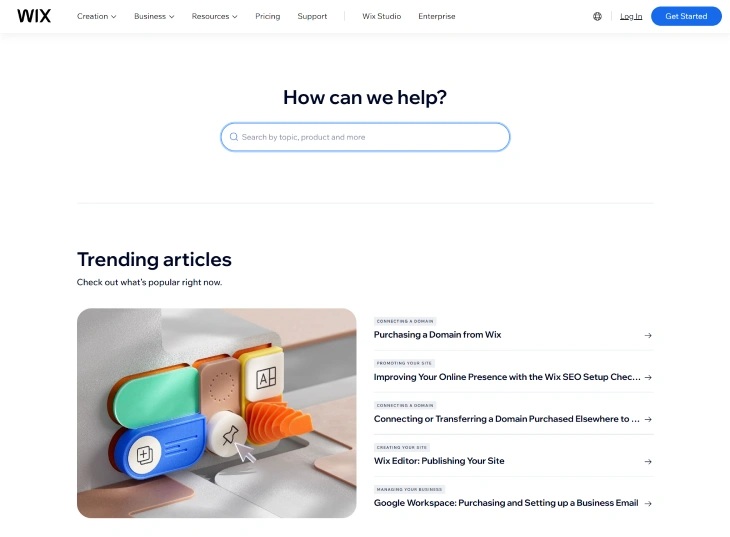
Shopify excels with round-the-clock phone, email, and live chat support in multiple languages, alongside a knowledge base, community forum, and specialized support options for enterprise customers.
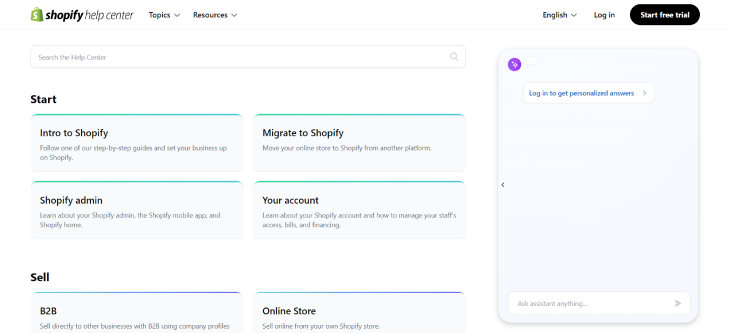
WordPress offers email support complemented by a comprehensive knowledge base and an active community forum, though its support isn't available 24/7. WordPress's vibrant community forum is invaluable for troubleshooting, and select plugins offer premium support for direct assistance from developers.
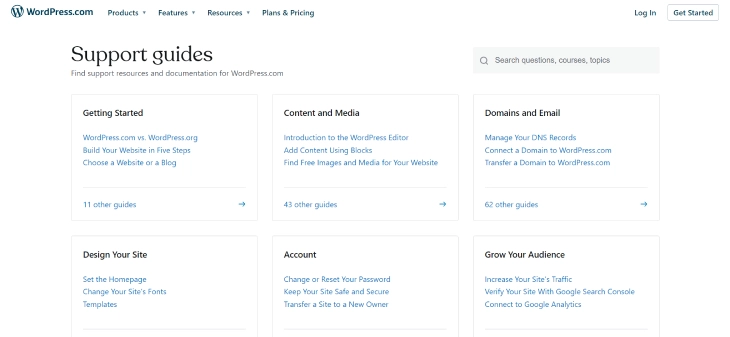
Support Quality
Wix offers 24/7 support from knowledgeable agents, addressing a broad spectrum of issues from technical difficulties to billing inquiries, though email response times may be slower. Shopify provides round-the-clock support with well-informed agents equipped to tackle a variety of challenges, including tech problems and eCommerce strategies, and includes additional services like priority support for enterprise customers.
Shopify users might find email responses slower than phone or live chat. WordPress support hinges on its community forum for advice and problem-solving, with the quality of support varying based on community expertise. For specific needs, some WordPress plugins offer premium support directly from the developers, though the quality of this support can vary depending on the developer.
Conclusion: Which Is Better - Wix, Shopify or WordPress?
choosing the right website builder depends on your specific needs and preferences. Wix is an excellent option for beginners and small businesses wanting an affordable and easy-to-use website builder. Shopify is the best choice for eCommerce websites, offering advanced features and excellent customer support. WordPress is ideal for those who want advanced design and customization options and have some technical knowledge.
By considering each feature-pricing plans, ease of use, design and customization options, eCommerce functionality, SEO capabilities, third-party integrations, and customer support of each platform, you can choose which website builder to use for your needs.
* read the rest of the post and open up an offer